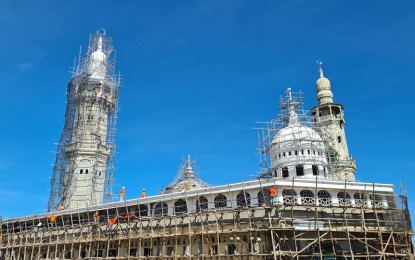
BANGON MARAWI. A mosque rises again in Marawi, nearly five years after the infamous siege that flattened the city. Task Force Bangon Marawi chairperson Secretary Eduardo del Rosario said on Friday (March 26, 2021) the target completion date in December remains on track. (Photo courtesy of TFBM)
MANILA – The Master Development Plan for the rehabilitation of Marawi City is about 50 percent complete, Task Force Bangon Marawi (TFBM) chairperson Secretary Eduardo del Rosario said on Friday.
Del Rosario, also the head of the Department of Human Settlements and Urban Development, visited Marawi City for ground inspection on Thursday.
He reiterated that the government-led rehabilitation efforts, eyed for completion in December, remain on track.
“The projects are in different stages of completion. There is 60 percent, 70 percent, there is 35 percent and 40 percent. So, I would say on the average, it’s between 45 and 50 percent accomplishment for the whole rehabilitation,” he said in a statement.
"Based on our Master Development Plan, we are on track with the target that we have set," he added.
The road networks undertaken by the National Housing Authority are the most crucial infrastructures in the rehabilitation, del Rosario said.
“The most important is the road network because from this, makikita natin ngayon yung magiging alignment, ano ‘yung magiging itsura ng ating (we will see the possible alignments, the possible look of the) open space," he said. "We are targeting that this would be completed by September or October this year."
He assured the road networks will be completed on time as they surpassed the target timeline by about three percent.
Del Rosario noted that the TFBM "strictly carried out pro-active methodology" to hasten the rebuilding efforts in the city and to step up recovery programs for the affected Marawi residents.
He cited various government interventions being undertaken alongside its private partners and civil society organizations for the conflict-affected families including the provision of emergency and quick response assistance.
“In any calamity-stricken area, the first phase of rehabilitation is to provide immediate emergency assistance. Early intervention activities take about six months to one year,” he said.
Since the rehabilitation started, del Rosario said the TFBM's 56 implementing agencies have been collaborating to ensure the unhampered provision of financial and livelihood assistance, food and medicines, health care services, and hygiene kits, as well as temporary and permanent shelters.
The second phase was debris management, which entailed removing tons of debris brought about by the five-month-long battle between terrorists and government forces in 2017.
It also included recovering and detonating unexploded bombs that took them about one year and four months, the TFBM said in a report.
The construction of vertical and horizontal infrastructure went full blast in July last year amid the Covid-19 pandemic, del Rosario said.
The TFBM was created under Administrative Order No. 3 issued by President Duterte on June 28, 2017, to ensure collaboration and convergence among national agencies and the local government units. (PNA)
